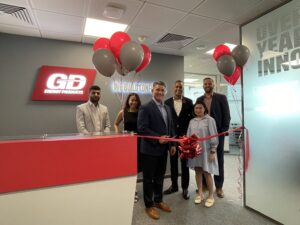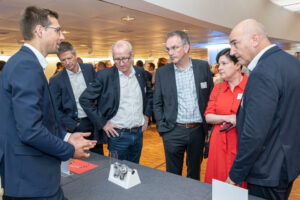![]()
Presentations will show how FieldComm Group collaborates with other standards development organizations to benefit end users.
FieldComm Group will hold a press conference at Hannover Messe in Hannover, Germany from 15:00-16:00 CEST on Tuesday May 31, 2022 in the Convention Center Room 11, and at the ARC Industry Forum in Orlando on June 6, 2022 at 3:00PM EDT in the Crystal D ballroom. Each presentation will demonstrate how FieldComm Group focuses on end users and their needs by collaborating to create standards. Additionally at Hannover Messe, FieldComm Group will be demonstrating many of their technologies in Halle 9 D68.
End users benefit when standards development organizations (SDOs) collaborate—especially regarding architectures, networks, and protocols—to deliver interoperability, ease-of-use, simpler integration, and backwards compatibility.
There are multiple organizations developing standards around digitalization for various industries, and some of these standards are beginning to overlap in scope, risking the creation of redundant work, and conflicting or excessive standards. FieldComm Group believes that a collaborative approach that aligns with other SDOs, with the active participation of end user organizations like NAMUR and the Open Process Automation Forum, will ultimately provide the best outcome for end users.
During the Hannover Messe and ARC Forum press conferences, FieldComm Group President and CEO Ted Masters will discuss collaborative relationships with other SDOs and end user organization. These efforts are targeted at creating end-to-end usage of digitalization technologies from field devices to control system infrastructure, and then to cloud-based analytics and optimization applications—all while accommodating the continued prevalence of 4-20mA and HART technology in the process automation industry.
SDOs need to align by taking advantage of each of their core competencies, while ensuring interoperability whenever feasible. FieldComm Group has been a pioneer of this collaborative model, aligning participants of all types in areas important to process automation to ensure effective digitalization standards development. The goal is development of a single adopted standard for each requirement, with broad adoption by all SDOs, automation suppliers, and end users.
A leading example of collaboration between SDOs is the long-standing partnership between FieldComm Group and the OPC Foundation. This relationship extends back to some of the earliest efforts towards creating Device Descriptions for instruments, and more recently for the process automation device integration model (PA-DIM®) and the field device integration (FDI) standards.
NAMUR, an international user association of automation technology and digitalization in process industries, is another collaborator. They played a key role in the creation of PA-DIM by defining user requirements in the NAMUR open architecture model (NOA). PA-DIM is one of the first technologies designed from the bottom up for machine-to-machine communications between digitally transformed systems using semantic IDs.
FDI was jointly developed by FieldComm Group, FDT Group, PROFIBUS & PROFINET International, and the OPC Foundation. The FDI tools and registration procedures are jointly owned by FieldComm Group and PROFIBUS & PROFINET International (PI). Over 100 registered FDI device packages are available today, and most suppliers of process automation instrumentation and systems are licensees of FDI software development tools. Additionally, FDT Group and the OPC Foundation are co-owners of the FDI specification, and the OPC UA Information Model for Devices specification is used within FDI.
FDI was designed for openness and the inclusion of new automation protocols, as well as the incorporation of innovative technologies. Since its initial release in 2015, EtherNet/IP, ISA100 Wireless, and MODBUS TCP support have been added to FDI technology.
FDI and PA-DIM are notable examples of how member organizations within an industry can collaborate on technology advancement, while still maintaining support for their unique offerings and installed base.
This type of collaboration and competition provides benefits to end users because no single architecture, network, or protocol standard is the best fit for every application. Users therefore need a range of choices to realize the best price/performance ratio and ease-of-use. Collaboration among SDOs provides the required flexibility by supporting FDI across a wide range of architectures, networks, and protocols.
The collaborative model employed today ensures a path to digitalization that recognizes the emergence of new technology, while realizing the continuing role of core process automation technologies. FieldComm Group core technologies coupled with collaboration provide the cornerstone of continuity required for digital transformation in the process automation industry.
This article is published by
FieldComm Group began operations on January 1, 2015 by combining all assets of the former Fieldbus Foundation and HART Communication Foundation. FieldComm Group is a global standards-based non-profit member organization consisting of leading process end users, manufacturers, universities and research organizations that work together to direct the …
Source of Article



